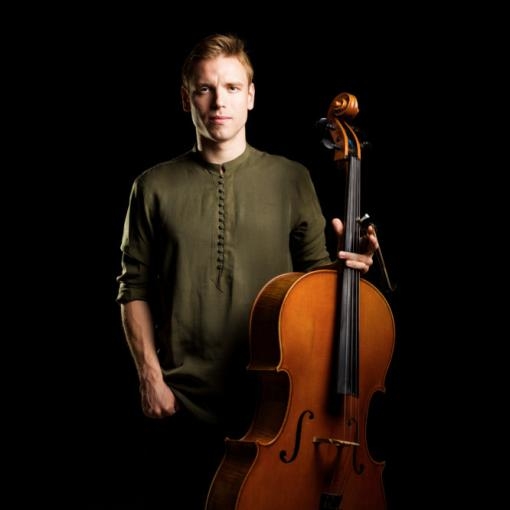We know several singing cello players from the domestic music scene: Olin Nejezchleba, who recorded his first solo album at the age of fifty; Tara Fuki, which even consists of two singing cellists; and Natálie Velšmídová, who shone out bright with her folk song remakes at the end of the millennium. However, Pavel Čadek is the only true singer-songwriter in the sense that he writes his own songs and uses cello as his main (or even the only) accompanying instrument. Moreover, thanks to his classical music training and his past with The Eclipse, a harder cello group, he is able to work with the cello freshly and, above all, in a non-folk manner, and that is why his instrument sometimes plays more than just an accompanying role. Although his debut album would be sufficiently varied even with cello only, Pavel decided to work with more sophisticated arrangements and invited accordionist Ondřej Zámečník, cajon player Jakub Špiřík and some other guests in episode roles to the studio.
Pavel Čadek says on his internet profile that he got to the craft of songwriting after his fellow player in The Eclipse told him that his songs are more folk than metal. "It made me laugh at first, but then I thought maybe there was something to it,” adds the folk musician who also has experience in accompanying his colleague Ivo Cicvárek. The fact that his entry into folk waters was a good choice is demonstrated, among other things, by the evaluators of the genre server Folktime, who elected, as of 31 December, his album Cellofolk as the best domestic album of 2019. "Beauty. Even better than live. Perfect alternation of the atmosphere," wrote the otherwise stern reviewer Miloš Keller from Country Radio. And Pavel Rada from the Internet Radio Folk adds: "Smart texts, an interesting concept of cello as a solo instrument and arrangement of accompanying instruments."
If Pavel Čadek were “only” a singer-songwriter with a cello, his production would not evoke such enthusiasm. But on his album, at least three roles happily met up, and Pavel handles them grandly – being a great player, an imaginative arranger, and one of the best lyricists who have appeared on our scene lately, which is extremely important for the craft of songwriting. Čadek is often put into the same genre rank with more established singers-songwriters such as Michal Horák, Pokáč or Tomáš Klus. Despite all due respect to Klus' art of creating word puns, Pokáč's wit and Horák's fresh ideas, Čadek beats of all them with some of his lyrics. If on our young songwriting scene there is someone who can combine situational humour, the art of parody, puns and sense of everyday yet powerful story, then it is Pavel Čadek. On the album, he presents himself as an excellent lyricist already in the first track, in which he only seemingly "has nothing to say" (Dobrý den [Good Morning]). In the second song (Ženská, co mě brzo zničí [A Woman Who Will Soon Destroy Me]), he layers up the ideas so quickly and intensely that one forgives him even some offences against grammar (wrong use of a transgressive), the Moravian form of "chcu" ("I want", the correct Czech form being "chci") or peculiar declension, although in favour of a brilliant rhyme ("Jsi cesta, z které letí rajče / na hlavu Richarda Krajče" – a pun that obviously will not work in English and means "You are a path from which a tomato flies / on Richard Krajčo's head"). Quite different is his work with the lyrics in Úředníkův song [A Clerk's Song], in which, in the role of a man with a rubberstamp, he disarms listeners with the well-known question "What was the name?".
However, Čadek is not only a songwriter-humorist. Yes, the first time you hear his hit Nelajkla mi status [She Hasn't Given a Like to My Status], you may roll on the floor laughing. But the singing cellist counterbalances his witty self with, for example, original metaphors in a more serious song Ona má [She Has] ("She sounds like maple flutes / and your voice like sand in an oboe when the player is out of his mind"). And just like he works with different layers of language and types of poetic imagination, he also uses his instrument in different roles. Actually, each song has a different sound of the cello that he masters once as a classical player, another time as a folk musician, and yet another time as a metalist, and in the song Hej holka [Hey Girl] even as a hip-hopper. There is also a happy combination of cello pizzicato with protracted tones of accordion or alternation of singing registers – from folk narration through almost rap to real singing.
Therefore, if someone has a weakness for traditional-style singers-songwriters with a focus on "smart" lyrics, likes humour and at the same time cares about the musical level of the songs and the quality of singing, Pavel Čadek is a great choice, one of the best possible on the current domestic scene.
Pavel Čadek – Cellofolk. Self-published, distribution: Indies Happy Trails. 13 tracks, total playing time: 44:41
































No comment added yet..